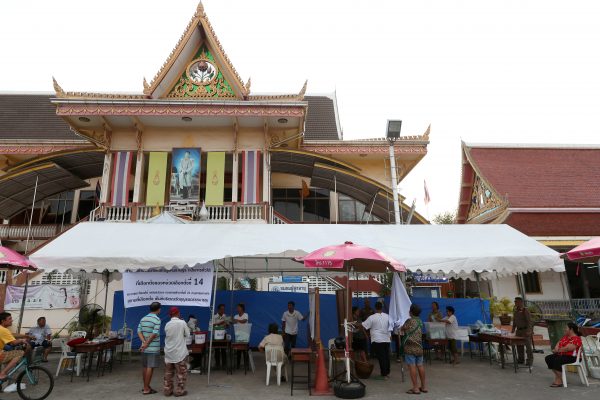Official results are not due until 9 May, and a lot can happen in this interim period as parties seeking a coalition jockey and horse-trade. This interregnum is also when the EC will respond to scores of complaints. It will inevitably disqualify some winners, potentially altering the result.
What does the outcome look like from the junta’s position? It seized power in May 2014 and made it clear that one of its prime tasks was to destroy the influence of former prime minister Thaksin Shinawatra and his political parties. The junta wrote a constitution and a set of electoral laws aimed at undermining pro-Thaksin parties. It established the Palang Pracharath Party (PP) to represent the junta at the elections, with General Prayut Chan-o-cha as its nominated prime ministerial candidate.
As well as using the military to stalk opposition candidates and intimidate voters in several areas, the junta spent lavishly on programmes that were meant to give PP an electoral advantage. The junta and Prayut also bent their own electoral laws in campaigning for PP.
For all this effort, the unofficial results show that the junta has been largely unsuccessful. Though the PP seems to have gained the most votes, it is the pro-Thaksin Pheu Thai Party that has grabbed most seats.
Even so, Pheu Thai’s overall vote was down. This reflects the impact of the junta’s new and complicated electoral system, designed to reduce the power of big parties. In attempting to maximise the outcome for pro-Thaksin parties, Pheu Thai partnered with the Thai Raksa Chart. As a result, Pheu Thai nominated candidates in just 250 of 350 constituencies, with Thai Raksa Chart expected to deliver additional seats, mainly on the complicated party list.
But this strategy collapsed when Thai Raksa Chart nominated King Vajiralongkorn’s elder sister, former Princess Ubolratana, as its prime ministerial candidate. Within a few hours the King had vetoed this move, and the EC successfully moved to have the Constitutional Court dissolve Thai Raksa Chart.
While the junta’s new electoral system operated against Pheu Thai, it worked for a brand-new and avowedly anti-military party, Future Forward (FF). Led by young urbanites, the fledgling party won the third highest number of votes. By holding on to power for so long, it seems that the junta created a sizeable anti-military constituency that worked in FF’s favour. Indeed, it is an anti-military alliance, composed of Pheu Thai, FF and several minor parties, that was the first to claim enough seats to form a coalition government. That is not what the junta wanted or expected.
The rise of FF is mirrored by the collapse of the Democrat Party’s vote. Over the past decade, Thailand’s oldest party has positioned itself as anti-Thaksin and has supported several interventions that brought down elected, pro-Thaksin governments. The Democrat Party’s decline probably means that many of its supporters who backed the 2014 coup and the military junta went over to the junta’s PP. Its voters who worried about the military’s ongoing political domination also had an alternative in FF, positioned as both anti-military and pro-democracy.
And then there is the monarchy. With the junta and military making their loyalty obvious to all, even selecting the date for the election revolved around King Vajiralongkorn’s choice of a coronation date. The junta directed voters to select pro-monarchy candidates and parties, played on a long-held elite view that Thaksin was anti-monarchy.
If the interim result stands and a Pheu Thai-led coalition government is formed, a political stalemate would result. This is because a special article in the junta’s constitution had the prime minister selected by a joint sitting of the junta-appointed Senate and House of Representatives. This opens the possibility of Prayut as prime minister and a government that opposes him.
Initially, the junta’s public response to the interim results was muted. Behind the scenes there was furious bargaining over a pro-junta coalition and the junta no doubt hopes that the EC can swing the result in PP’s favour through disqualifications and the party list.
But following rising discontent over the EC’s mismanagement a far more bellicose and threatening junta response erupted. A first signal for this was the King’s stripping of Thaksin’s royal decorations – a signal that a Pheu Thai coalition was unacceptable. Army Commander General Apirat Kongsompong reinforced this by attacking Thaksin and FF as disloyal to Thailand and the crown. Within 24 hours, police had accused FF leaders of sedition.
Now, the most pressing question is how far the junta is prepared to go in getting the election result it wants. Whatever they do, if they are identified as stealing the election, political conflict may result.
Kevin Hewison is the Weldon E Thornton Distinguished Emeritus Professor of Asian Studies at the University of North Carolina at Chapel Hill and an Adjunct Professor at the University of Macau.

